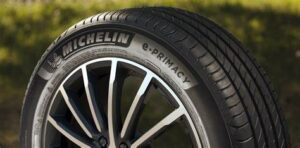
Unit 09
Brand stories: Michelin
新知思想/趣味科普
New Knowledge/Fun Science
BRAIN STORM
Share your ideas with your teacher and try to make sentences.
Are you familiar with the brand Michelin? What industry do you think, Michelin operates in?
VOCABULARY
Repeat these sentences after your teacher.
1. product-market fit (phr.) 產品市場匹配度
They were not product-market fit at first.
起初它們不適合產品市場。
2. far-flung (adj.) 遙遠的,分佈廣泛的
Our over-reliance on plastic will have long-lasting and far-flung effects.
我們對塑料的過度依賴將產生長期而持久的影響。
3. creme de la crème (n.) 精英,精華
Have you experienced creme de la crème?
您使用過精華液嗎?
4. wear and tear (n.) 磨損,損耗
Tires are often subjected to wear and tear. They are seldom recycled.
輪胎經常會磨損。他們很少被回收。
5. necessitating (v.) 使…成為必要
Michelin is necessitating recycling of tires.
米其林必須回收輪胎。
6. prestigious (adj.) 有威望的,有聲望的,受尊敬的
Michelin is now a prestigious brand.
米其林現在是一個著名的品牌。
7. coveted (adj.) 令人垂涎的;夢寐以求的
He won the coveted position.
他得到了人人都嚮往的職位。
Dialogue
Read the dialogue aloud with your teacher.

Michael, I just realized that the Michelin Red Guide is published by the French tire company Michelin. What do tires have to do with fine dining?
Michael,我剛意識到《米其林紅色指南》就是法國輪胎公司米其林出版的。輪胎和高級美食有什麼關係呢?

Well, when they first opened, they had a great product, but not really a great product-market fit of which to speak.
嗯,公司剛起步的時候,產品很好,但與市場的契合度不是很高。

Go on…
然後呢…

So they started printing maps and guidebooks containing information about exclusive restaurants in far-flung places, encouraging motorists to drive there..
所以他們就開始印製地圖和指南,其中包含分佈廣泛的高檔餐廳的信息,以鼓勵人們開車前往。

Oh, makes sense. All that driving to experience the creme de la creme of fine dining would put a lot of wear and tear on their tires.
哦,有道理。為了體驗高級美食的精髓,人們開車出行,這樣輪胎的損耗就會大大增加。

Thus necessitating demand for replacements!
所以就必須更換輪胎了!

But the question remains, why should we still care about it? Why is a Michelin star still so prestigious and coveted?
但問題是,我們為什麼現在還是關注米其林指南呢?為什麼米其林之星依舊享有盛譽、讓人垂涎?

I would argue that it’s partially because of their notoriously strict standards.
要我說的話,一部分是因為米其林的標準是出了名的嚴苛。

You mean “elitist standards,” right? It’s been said that the rating system is biased in favor of French cuisine. I guess that’s why I prefer the inclusivity of Yelp!
你是說“精英標準”吧?據說評分系統對法國菜是有偏好的。我想這就是為什麼我更喜歡Yelp的包容性。

But those apps and their algorithms can be gamed. It’s a lot harder to game an incorruptible critic who does their work anonymously.
但那些應用和它們的算法是可以被操縱的。但想操縱一個匿名工作、廉潔正直的評論家可要困難得多。
Grammar
I would argue
In today’s lesson, we see the phrase “I would argue” used to answer a question about why Michelin stars are still so coveted.
Why would someone use “I would argue” instead of just “I argue” or “I think”?
For one, although you will read “I argue” in a lot of formal writing, English speakers generally don’t use it in daily speech.
“I would argue” on the other hand, is used all the time. Generally speaking, when we use this phrase we’re not really making an argument. Instead what we are doing is softening our speech.
Some may take this speech-softening principle further and use phrases like “some would argue.” It allows speakers to give opinions while avoiding mentioning the source or specific conditions of the argument.
1. I would argue that the reason you are so sick is because of your bad diet.
2. In this paper I argue that the relationship between language and culture is inexorable.
3. I might argue that globalization has had more positive effects than negative.
4. _________________________________________________________________.
DISCUSSION
Make a conversation with your teacher.
1.What brand advertisement have you heard recently? What do they advertise about?


